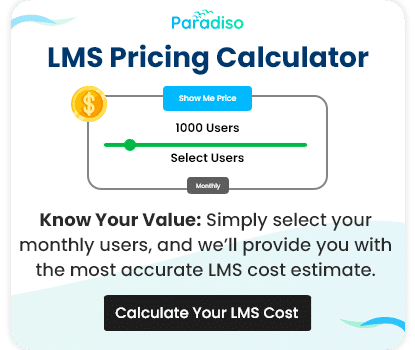The Power of Integrating Salesforce with an LMS
Integrating Salesforce with a Learning Management System (LMS) like Paradiso LMS brings the best of both worlds together: Salesforce’s powerful CRM and analytics capabilities with a robust LMS that can handle all of your training needs. Here’s how Salesforce LMS integration can work for you:
1. Course Data Synchronization
Salesforce does not natively synchronize with training content or track learner progress. However, with a Salesforce LMS integration, you can synchronize course data between your LMS and Salesforce, ensuring that the data remains consistent across both platforms. This means that any updates to your training programs are automatically reflected in Salesforce, reducing manual entry and preventing errors. Course updates that would typically require scheduling, controlling, or managing manually now happen seamlessly with the integration, improving efficiency and saving time.
2. Course Compliant Audit Reporting
In industries that require compliance training and audits, tracking and managing training completions can be challenging. Salesforce helps streamline this process by storing important data for clients, customers, and partners, which can then be pulled into the LMS during compliance audits. Salesforce LMS integration enables flexible reporting structures that simplify the process for auditors, allowing them to generate detailed reports about user progress, completion rates, and course certifications. This also enhances transparency and helps organizations stay on top of regulatory requirements.
3. eCommerce Capabilities for Selling Training Courses
One major benefit of integrating Salesforce with an LMS is the ability to sell training services online. Salesforce LMS integration makes it easy to set up an eCommerce platform where you can sell course materials, certification programs, and other training services to customers. This is particularly useful for educational institutions or organizations that offer third-party training services and wish to monetize their training programs. The integration provides a smooth connection between eCommerce systems and the LMS, enabling seamless purchasing, registration, and payment processes for online courses.
4. Streamlining Training Across All Stakeholders
For organizations that need to train not only employees but also customers and partners, Salesforce LMS integration can help streamline the process. Salesforce integrates with your LMS to ensure that product training, certifications, and other learning programs are delivered effectively to all relevant stakeholders. For example, you can track the progress of product certifications or see how far users have gone through specific training programs. It also eliminates the need for manual data entry and syncing, reducing errors and administrative work. Whether for employee onboarding, product certification, or partner training, this integration streamlines your training processes for efficiency.
5. Improved Learner Insights and Analytics
With Salesforce LMS integration, organizations gain better insights into the effectiveness of their training programs. Salesforce’s analytics tools, when combined with data from your LMS, provide a complete view of training performance. By tracking user activity and learning outcomes in Salesforce, you can measure the impact of your learning programs and make data-driven decisions for improvement. This powerful combination of Salesforce’s CRM capabilities with the analytical depth of an LMS helps managers and learning professionals understand training effectiveness and take necessary actions to enhance employee skills.


















